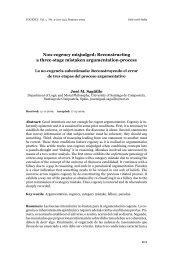Cogency v2 n2
Cogency v2 n2
Cogency v2 n2
You also want an ePaper? Increase the reach of your titles
YUMPU automatically turns print PDFs into web optimized ePapers that Google loves.
COGENCY Vol. 2, N0. 2, Spring 2010<br />
Some “neurophilosophers” claim that such indeterminacy is a defect in<br />
our psychological concepts – one threatening the very rationality our everyday<br />
psychological judgments. 28 Their claim, we suggest, is based on the<br />
dubious view that all cognitively significant judgments are propositions with<br />
determinate sense (p v ~p), and that all results of a competently employed<br />
method of judgment must agree (differences being, in principle, traceable<br />
to a mistake).<br />
Wittgenstein’s disagreement with such philosophers might be called a<br />
“deep disagreement.” He tries to persuade them to see the “raggedness” of<br />
our everyday (“folk”) psychological concepts as appropriate and desirable<br />
rather than as a defect. This requires getting them to “think outside the box”<br />
– the box of the only reasons they’re used to calling relevant.<br />
Ben Tilghman (2001, pp. 248-49) provides a nice illustration of how such<br />
a persuasion might go:<br />
That there is only better and worse judgment about the genuineness of<br />
human feeling is not a shortcoming, but is a feature of the concept of<br />
genuineness. We must remember that it is not merely a fact about mathematics<br />
that there is agreement in judgment about the results of calculation,<br />
for that agreement is a constituent of our concept of mathematics.<br />
If there were no such general agreement, then whatever it is that we are<br />
doing with columns of figures would not be what we call adding and subtracting.<br />
Similarly, if there were strict procedures to determine the correctness<br />
of judgments about other people, then whatever it is that we<br />
would be doing in thinking, for example, “I am sure she loves me,” is not<br />
what we would call judging the genuineness of human feeling. At the<br />
edge of materialism we reach one limit of language. Were we to venture<br />
beyond the edge our lives would be unrecognizable. 29<br />
Of course, not everyone will find Tilghman’s Wittgensteinian ‘persuasion’<br />
persuasive. But is that a defect? Or shall we say: “If there were a strict<br />
procedure for determining whether it’s really a defect, then applying it is<br />
not what we would call doing philosophy (or investigating a deep question).”<br />
28<br />
For example, Paul Churchland (1988: 179-80).<br />
29<br />
“The limits of my language mean the limits of my world” (TLP 5.6). “And to imagine<br />
a language means to imagine a form of life” (PI § 19).<br />
72








